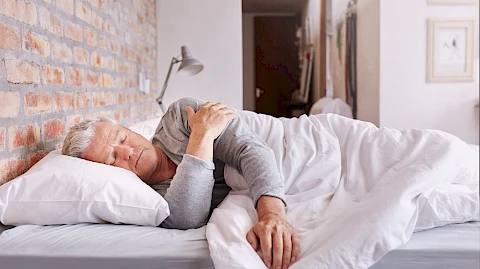
Parkinson’s disease is a neurological condition that affects motor function, but its effects go well beyond movement. Sleep challenges are a persistent and frustrating part of living with the condition for many older adults. Changes in the brain, symptoms of the disease, and even the timing of medications can disrupt rest. Improving sleep for seniors can create a more comfortable and consistent daily routine.
Sleep Challenges in Parkinson's
Individuals with Parkinson’s often experience a range of sleep-related issues. Insomnia is common and may include trouble falling asleep, staying asleep, or waking up too early. REM sleep behavior disorder may cause people to act out dreams, creating the risk of injury and restless nights. Others deal with restless legs syndrome, which causes uncomfortable sensations in the legs and an urge to move them, especially during rest. Sleep apnea, where breathing repeatedly stops and starts during sleep, is common and can lead to exhaustion during the day. These disruptions can reduce sleep quality and daytime alertness.
Simple Habits That Support Better Sleep
Practicing good sleep hygiene can make a meaningful difference. A consistent sleep-wake schedule helps regulate the body’s internal rhythm. Seniors with Parkinson’s benefit from sleeping and waking at the same time each day, even on weekends. A quiet, dark, and cool bedroom, paired with a supportive mattress and pillow, can make it easier to fall asleep and stay asleep. Creating a calming routine before bed, such as listening to soft music or reading, can help signal that it’s time to wind down. If naps are necessary during the day, they should be short and early enough not to affect nighttime sleep. Medication timing also contributes to restlessness, so a healthcare provider can offer guidance if adjustments are needed.
Daily Lifestyle Choices That Make a Difference
Regular physical activity can improve nighttime sleep while also enhancing strength and flexibility. Walking, stretching, or chair yoga are helpful options. Eating lightly in the evening can also help prevent disruptions during the night. Caffeine and alcohol may interfere with sleep cycles, so limiting them, particularly later in the day, can reduce disturbances. Relaxation techniques like deep breathing or meditation can ease tension and make it easier to unwind before bed. These practices are often included in professional Parkinson’s care programs that focus on helping older adults feel more relaxed and supported throughout the day.
Knowing When to Involve a Healthcare Provider
If sleep problems continue despite making adjustments, it may be time to consult a healthcare professional. Frequent falls at night, loud snoring with pauses in breathing, or excessive daytime drowsiness may indicate a more complex issue. With the right evaluation, care plan changes can improve comfort and reduce nighttime risks.
Local Support That Encourages Restful Routines
Improving sleep for seniors can make everyday tasks more manageable and reduce strain. For seniors in St. Paul, Roseville, New Brighton, Shoreview, and North Oaks, Senior Helpers Roseville, MN, offers experienced support tailored to individuals with Parkinson’s disease. Services are personalized, including routine-building, overnight care, and daytime assistance. Reach out to Senior Helpers Roseville, MN, to learn how local Parkinson’s care services can provide added peace of mind for seniors and their families.